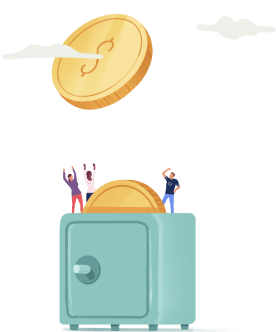Summary
Student loan refinancing is common, especially for people with private student loans, with an estimated 50,000 professionals doing so each month.
It involves taking out a new student loan to pay off the existing debt you have, lowering your rate and overall cost.
Historically, DACA recipients had limited options available for refinancing; however, we’ve recently gotten a new deal available to DACA graduates.
How it works
Fill out our quick simple form (2 mins)

Visit our partner with your link (10 mins)

Complete the refinance (45 mins)

How we save you money

Lenders spend so much money on marketing
In comparison, 80%+ of our members find out about us from a friend.
We pitch lenders an alternative
Give our members better deals and avoid spending thousands of dollars per customer on marketing. It saves them time and money, and we end up getting our community better rates and cash back for free.
Our Journey
Our founders Nikhil and Chris started Juno a few years ago when they were shopping around
for loans for Harvard Business School. Since then, they’ve been immersed in the student loan
industry, regularly speaking with key players nationwide and researching the market.
Every year, we make all the lenders compete to offer the best deals to our community.
In the process, we pore over dozens of rate tables, and stay up all night crunching
spreadsheets to map out which lenders offered the most people the best rates. Through this data analysis, we're confident that our choices are the best for the community.
Since Juno members never pay us, we charge all lenders a set fee that is
agreed before the negotiations begin. That way, we can’t be swayed by a larger financial
incentive. The only way to be featured on our site is to offer our community the best deal.
The Power of Numbers
$1,217,951+
in cash back earned by our community
244,000+
members
$1B+
in loans
Hear from a member!
“I was with Sallie Mae and my interest rate was 10.75%, but I refinanced
through [Juno] and not only got my rate down to almost 4%, but I also got $1000 cash.
I got paid. To save money.
So make sure as soon as you graduate and get your first paystub to refi. It's super easy and
literally takes under 10 minutes, the hardest part is typing in how much you have saved in
all our accounts to prove assets as well as entering your social.
Their system literally automates all the hard parts out of it. Not everyone will save as
much as me because I'm kind of an extreme case.
I refinanced 170k at 10.75%V to 4.04%F, cutting my monthly payment from $2800 to $1250.
This is totally free and you can still write off payments on your taxes. Hope this helps
someone...
Of course, make sure you do plenty of research and ask tons of questions to the lender
before you refinance any debt.
I applied for refi literally everywhere and this was the best deal by like 1.2% and was
much easier to fill out the app than at other places.”
Josh C.
Georgia Institute of Technology
Who is refinancing for?
For people with high interest student loans
This can apply to individuals with either federal and private loans.
For private loan borrowers
There’s little downside associated with refinance, and a large potential upside in terms of savings, and reducing your monthly payment. Although it’s uncommon, do note that you may lose benefits associated with your underlying private loans if you refinance. If you file for bankruptcy, you may still be required to pay back this loan.
That said, you should always consult a financial advisor before taking any action. This article is not intended to be financial advice, and we urge you to do your own research independently.
Can I refinance?

While we don't determine eligibility (our lending partners do) there are some basics that are usually needed.
Note that while most lenders require a completed degree, one of our partners Earnest now has an option if you did not graduate. The last attending date needs to be longer than 6 years ago, and your credit needs to be above 700.
Earnest
Earnest is owned by one of the largest student loan servicers in America. While they
operate as a separate unit, they have the backing and security of an established provider.
As a Juno member, you will receive a rate that's 0.25% lower than what you'd receive if you
were to go directly to Earnest. Combined with their already low rates, this can make a
significant difference in the amount you repay.1
Rates: Fixed starting at 3.95%2,3
APR, Variable starting at 5.63%2,3 APR including the .25% autopay discount and the .25% Juno discount.
Juno Benefit: Rate reduction of 0.25%1
Check: Soft Credit Check to check rates; Hard Credit Check to refinance
Cosigner: You may be able to refinance with a cosigner with Earnest if you are unable to qualify on your own.

What happens when you refinance?
Usually after people refinance a loan, we hear “why was that so easy?” The truth is that the process is fairly straightforward.
On a basic level, you’re taking out a new loan to pay off your old loan.
Since you’re employed and are perceived as ‘less risky’, your new loan ideally has a lower interest rate, saving you money in the long run.
How to find out customized rates?
If you can answer these ten questions, you can probably go get customized rates within 5 minutes:
Then you can use a calculator to decide if the amount you'd save is worth proceeding.
Why does the term refinance still give me the willies?
The likely culprit: home mortgage refinance – between closing costs, cash-out refinancing that involves moving other debt around, and potential loss of protections, this cousin of student loan refinance gives all refinance a bad rep.
In contrast, student loan refi through Juno doesn’t have any fees involved, and is basically a straight 1:1 refinance – that means you can only get a new loan covering the cost of your existing student debt.
That means that you can't borrow more than what you already owe. Student loan refi typically doesn’t involve collateral, unlike home mortgage refi where your house can be foreclosed on if you don't pay your mortgage bills.
As always, please consult a financial advisor for additional context.
Remember, refinancing private student loan debt typically doesn't result in the loss of protections; refinancing federal student loan debt can result in the loss of certain protections (income-driven repayment, forbearance options, etc).
You can always pick and choose what you'd like to refinance without affecting all your loans.
Is now a good time to
refinance private student loans?
Rates hit historic lows back in November 2021, and started going back up since then. Don't forget that you have the option to refinance multiple times. Some of our members refinance their loans once a year if they can get a better rate.
Got questions?
Drop us a line at hello@joinjuno.com.










